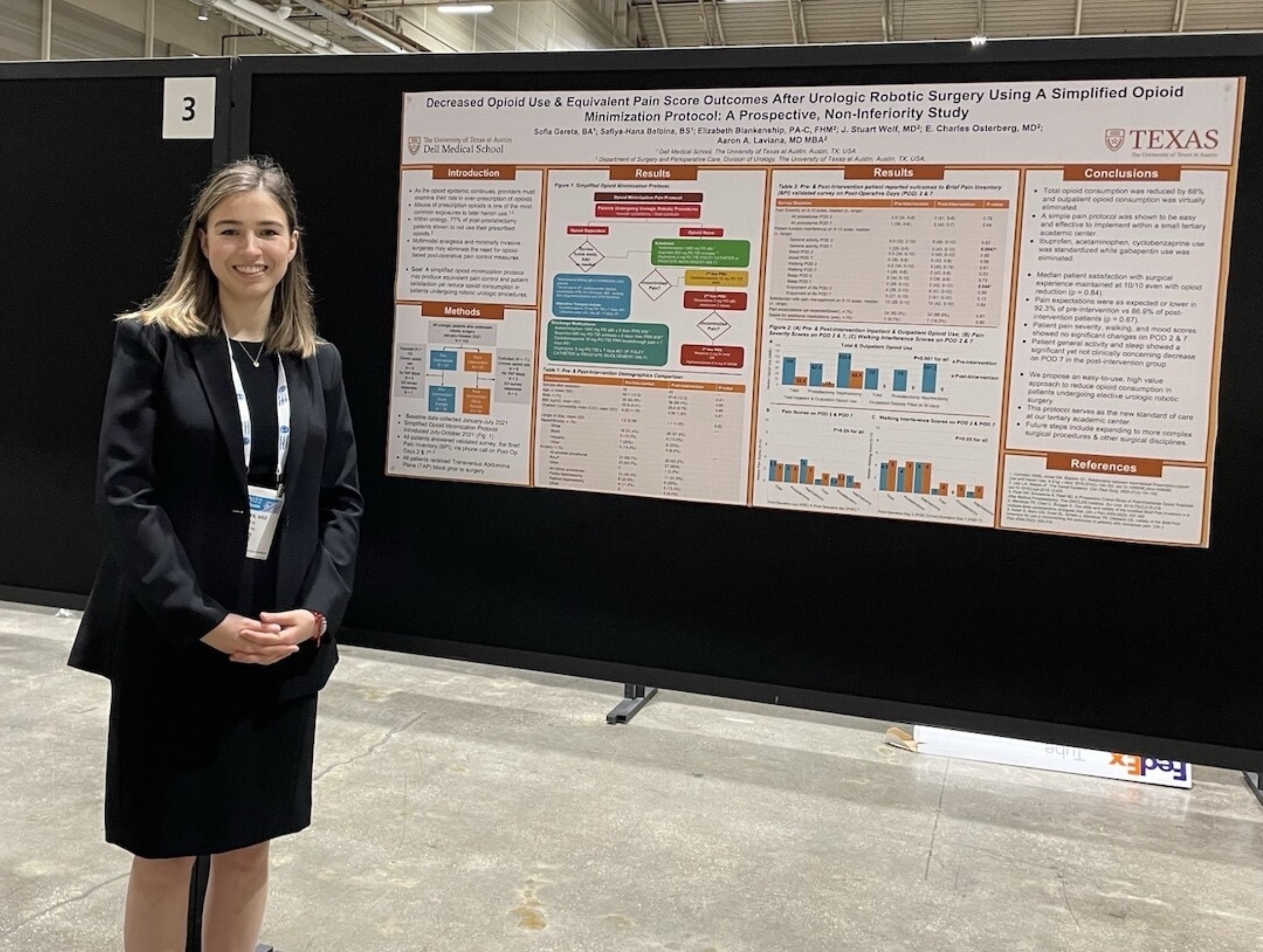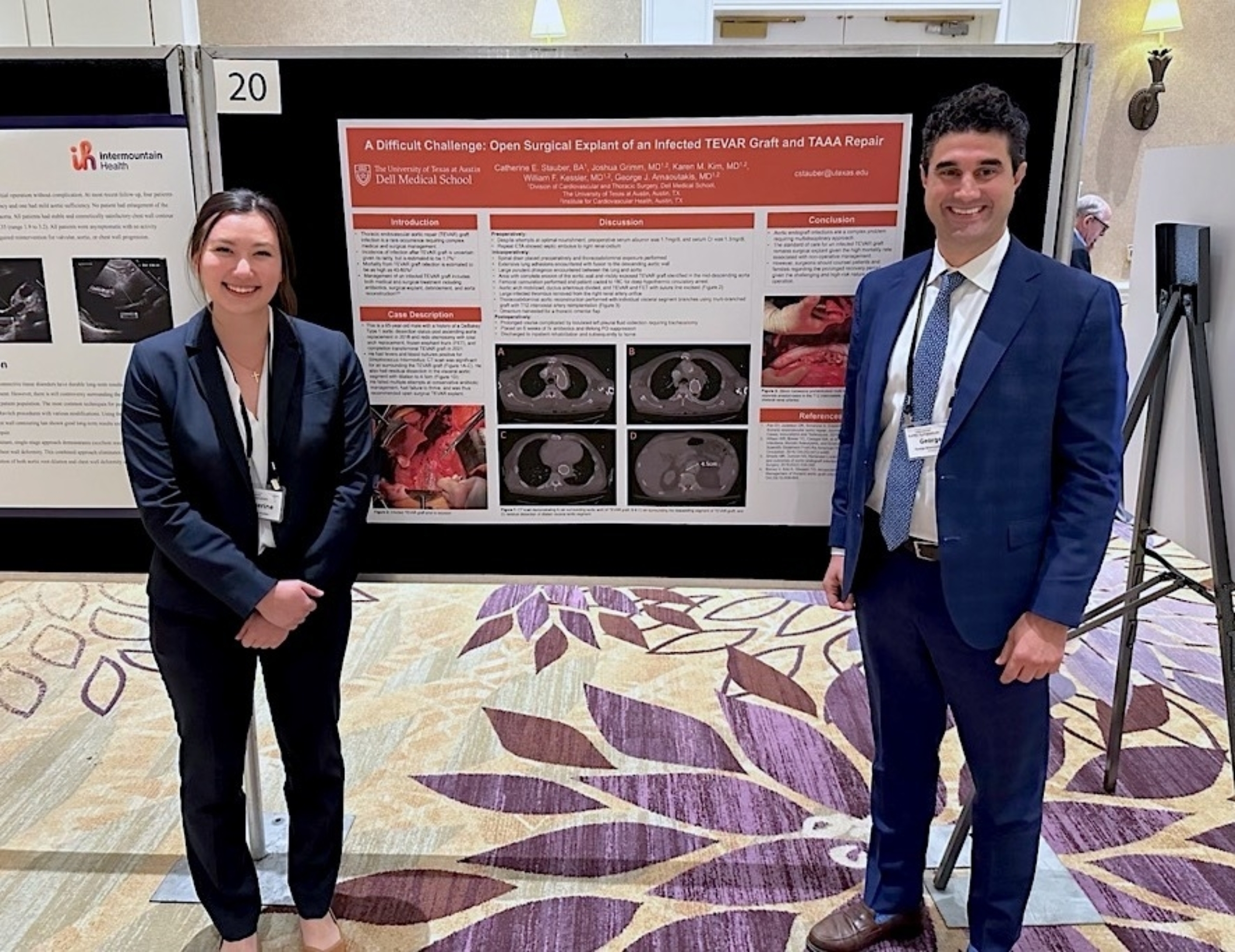Meet three Dell Med students who, mentored by leading Austin surgeons, are making an impact in improving access and quality for surgical procedures, locally and beyond.
From a breadth of world-class faculty mentors to the school’s unique Growth Year carving out dedicated time for independent inquiry, students at Dell Medical School are equipped to begin transforming health care through discovery early. Research topics and methods are all different, but the aim is the same: Move the needle on delivering person-centered care that rewards value.
“Students bring a renewed enthusiasm to long-held questions about health and science, and with their fresh perspective, can often identify new areas of investigation that we haven’t ever considered before,” says Suzannah Creech, Ph.D., Dell Med’s assistant dean of research. “With the caliber of research resources and clinical faculty mentorship available at a place like UT Austin, students have a unique opportunity to begin making their mark on medicine’s body of knowledge early.”

Sofia Gereta, Dell Med Class of 2024
From Investigation to Direct Patient Care
During the COVID-19 pandemic, Sofia Gereta, Dell Med ‘24, noticed an increase in outpatient procedures, meaning patients did not require overnight hospitalization. Gereta wondered about the benefit of maintaining the protocol long-term. For example, did patients really need to be hospitalized for procedures like prostatectomies (removal of the prostate)?
To investigate further, Gereta worked with Aaron Laviana, M.D., assistant professor at Dell Med and urologic oncologist at UT Health Austin. Gereta tracked Laviana’s patients’ status after their surgeries, comparing readmission and complication rates as well as hospitalization status and patient satisfaction levels. The results, published in a paper the pair co-authored in the Journal of Urology, revealed no differences in outcomes between patients who were hospitalized versus sent home the day of their procedure.
“As a result of Sofia’s efforts, we now send a majority of patients home on the same day while avoiding postoperative narcotics and ensuring no difference in patient satisfaction,” Laviana says. “Being able to advance the needle in urologic oncology from a research perspective would not be possible without students such as Sofia.”
Research to Inform Federal Policy
Access to surgeons is highly variable across the United States. Vishal Patel, Dell Med ‘24, decided to investigate whether access to surgeons had improved over the past decade following federal investment programs aimed at strengthening the surgical workforce.
Working under the guidance of Alex Haynes, M.D., associate chair for investigation and discovery in Dell Med’s Department of Surgery and Perioperative Care, Patel studied data from every county in the United States over ten years. He evaluated trends in per capita surgeon supply year over year and assessed whether those trends differed across rurality and social vulnerability.
The results? Not only were there still significant gaps in surgical access for rural and socioeconomically disadvantaged counties compared to urban and wealthier communities, but those gaps had actually widened.
“This is particularly concerning for rural and medically underserved communities, as limited access to surgical care has been linked to poor outcomes and will continue to perpetuate health inequities if unaddressed,” Patel explains. “Our findings provide a more comprehensive understanding of disparities in access to medical and surgical care, which are timely to inform several legislative proposals currently being considered in Congress to reduce inequities in health care access among underserved populations.”
Additionally, Patel has worked and published original research with Haynes and other faculty across disciplines at Dell Med and beyond to investigate a wide range of questions related to oncology and health care access.
“It has been a pleasure to work with Vishal and watch him apply his enthusiasm and skills to an array of important clinical questions,” Haynes says. “Importantly, he has been a catalyst for other students in their research, helping with methodology and quantitative analysis.”

From left: Catherine Stauber, Dell Med Class of 2025, and George Arnaoutakis, M.D.
Global Lessons for Local Impact
Catherine Stauber, Dell Med ‘25, came to medical school armed with years of global health research under her belt. After a clinical rotation with the Texas Center for Pediatric and Congenital Heart Disease, Stauber sought to use her skills in time-driven, activity-based costing methodology to investigate the true cost difference of heart surgery for families across the socioeconomic spectrum and from different insurance statuses.
“You can’t increase the value without understanding the cost of care,” Stauber says. “It really affects the experience that you have — taking care of your child — even if you’re looking at two families with the same diagnosis.”
Working alongside preeminent surgical faculty including Charles D. Fraser Jr., M.D., and Carlos Mery, M.D., Stauber recruited patient families and collected data from families whose children were undergoing heart surgery. Stauber’s findings indicated that socially disadvantaged families with congenital heart disease ultimately suffer a worse psychosocial burden.
“Catherine has embedded herself in our clinics to explore — through observations, surveys and interviews — what it means for patients and families of diverse backgrounds to receive care,” Mery says. “Her research has already taught us how to modify our clinics to improve the value of the care we provide.”
Separately, under the guidance of leading adult heart surgeons, Stauber is conducting case-based research into complex surgical procedures like graft removal and aortic repair.
“Catherine exemplifies the profound value of having a medical school at The University of Texas — she is integral to the future of medicine,” Fraser says. “She inspires us to be better.”